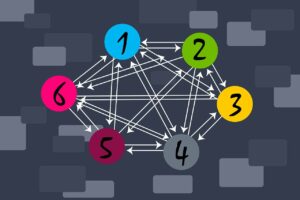Interlinking between your Sites. Running a Network of Sites and/or Domain Farming
 What’s this about? This is an Auto-Response for the very common topic about linking between sites you own. It is an attempt to compile comprehensive information for questions and issues such as:
What’s this about? This is an Auto-Response for the very common topic about linking between sites you own. It is an attempt to compile comprehensive information for questions and issues such as:
- Can I link to my other sites?
- What’s wrong with linking between my own sites?
- Why do you say linking between sites I own is bad?
- What’s a Domain Farm?
- Why shouldn’t I link to my other sites?
- Linking between mutually owned/maintained sites.
- Linking between multiple sites for the same/similar topic/audience.
Request a Call-Back
Glossary: ‘Domain Farm’ What is it?
This is simply a “name” – a label used by many SEOs and webmasters to describe the action/existence of such interlinking between a larger number of websites controlled by a single person or company.
It’s not really a technical term at all.
It just saves us having to say “linking between multiple sites you own or are in control of.”
First Up to Bat: The Google Webmaster Guidelines
Basic principles: Don’t participate in link schemes designed to increase your site’s ranking or PageRank. In particular, avoid links to web spammers or “bad neighborhoods” on the web, as your own ranking may be affected adversely by those links. More info here…
Basically you should not be attempting to manipulate or “game” the Google Search Rankings via Links.
#FunFact: In many cases the ONLY reason you are linking to your sites is because “they are your sites.” It normally has nothing to do with Quality or Usefulness!
It’s simply a way to boost your own rankings, increase DA/PR/AHR/Whatev-R and use a little Keyworded Link Text to go that bit further.
JohnMu made a post sometime back, saying something very similar:
- “Would you link to that site if it wasn’t yours?”
- “Would you link to that site if it was a competitor’s?”
- “Would you link to that site if there was no benefit in doing so?”
If you answer “no” to any of the above, guess what you shouldn’t be doing.
With all that said, the chances of actually getting penalized for this are pretty slim. You are not likely to get a “penalty,” which is to say “a modifier to your rankings in the negative,” for normal, day-to-day behavior among your own sites.
So… if it’s not gonna get me penalized…
Yup, I can see where your mind is headed; if there is no punishment, then why not do it?
 Well, why do you think I’m spending time typing this up?
Well, why do you think I’m spending time typing this up?
Because I’m tired of typing this sort of thing upmteen times per week/month on Twitter, Quora, and in other places!
Do you realize the number of people/topics asking about this subject?
Do you realize the number of people I run across weekly, that “Domain Farm?”
While there may be no actual “Google penalties,” there may be some very real “consequences” and “occurrences” that you should be aware of.
So we will cover them now 😀
Resource Wastage
Quite literally we are talking about wasting time and money.
- How much time does it take to setup X number of sites?
- How much time does it take to run and maintain those sites?
- How much does it cost for hosting?
- How much does it cost for the Domain Names?
Sure – it may be peanuts in the greater scheme of things – but that’s money that could be spent constructively on:
- a little advertising campaign to bring in additional traffic!
- a better hosting account that is more secure/reliable!
- a better designer to ensure your site appeals to the audience!
- a better developer so that your site provides additional functionality to satisfy the audience!
With a little forethought, planning, a solid content strategy, and a marketing plan, you could find yourself making far more money for considerably less effort.
It’s worth thinking about…
Relevancy and Context Matters…
Okay, we all know Google has many different ways of deciding what goes where and what ranks for which keywords.
Well… Links are clearly a LARGE part of that.
But… it’s not just the “number” of links, no matter what your SEO tells you.
No – it’s the Quality and how Topical they are too³!
This also cuts both ways!
If you have multiple sites that are not about the same subject – let’s say “Car Cleaning” and “Rabbit Breeding,” then what sort of message do you think Google will get when it looks at your Rabbit site, and sees links to a Car Cleaning service?
That’s right – You are actually damaging your own site by linking to a non-relevant site!
Once again for those in the back: “You wouldn’t link to someone else’s Car Cleaning site from your own Rabbit Breeding site, would you?”
Swinging the sword the other way, what sort of signal do you think it sends Google when it looks at your Car Cleaning site, and sees a link from a website about Breeding Rabbits?
It’s not really gonna help you rank for “car cleaning” is it?
If you know what I mean and I’m sure that you do.
Duplication/Repetition Annoys The Google
Google does Not like Duplication.
It does Not want to show the searchers X number of results that are nigh on identical, because that would annoy its users.
We are not talking about 100% exactly the same either.
There are cases where content is just “very similar” and still causes ranking/SERPs issues.
Google can and will filter out duplicates, be they full or partial, because they add nothing of real value/interest to the searcher, so why should Google include them in the results?
Why am I talking about Content Duplication?
Because in the main, many “Domain Farms” are sharing highly similar content between near identical sites!
In many cases we are left looking at 2, 3, 4 or more sites that are all basically about the same thing, targeting the same people, and using mostly the same text.
Worse still… In some cases it’s even stolen content being used between the various sites.
In other cases it’s “templated” content: stuff from affiliates/manufacturers’ descriptions, etc. That’s actually a separate topic all by itself, which I’ll cover later.
And it’s not smart or easy, since all those resources we mentioned before are likely to be wasted, because Google will filter most of it out of the SERPs!
Content Devaluation/Annulment
Try to think like Google: You use many factors to decide who ranks where and for what. One of those factors are links. You view Links as votes.
What would you do if you found sites voting for themselves?
 That’s right! Google may decide to devalue your links, or even annul them altogether. This can have major consequences, especially if the only links you really have are your own from your little farm, or spammy/self provided ones from blogs, forums and naff little directories.
That’s right! Google may decide to devalue your links, or even annul them altogether. This can have major consequences, especially if the only links you really have are your own from your little farm, or spammy/self provided ones from blogs, forums and naff little directories.
If those links are devalued/annulled it can cause your rankings to plummet.
It may even have a very perceptible impact on specific search terms, namely those you shoved into your link texts, which may now be worth less or worthless.
Okay – so what do we suggest?
This depends on the types of sites you are linking between.
If you are linking between non-relevant sites, you should seriously consider not bothering in the first place. As pointed out above, the relevancy/context issue is not really gonna help you… unless you intend to target rabbits who want their cars cleaned?
On the other hand, if you have multiple sites that are of a similar nature, or cover the same/similar topic[s] for the same sort of audience, consolidation may be a more effective approach than a link farm.
Rather than running multiple sites and interlinking them, would it not make more sense to run a single, more comprehensive site?
Think about it.
- You could save on the resources (less hosting/DNs/maintenance etc.)
- You could concentrate on a better “site” (improved design, functionality etc.
- You don’t have to worry about cross-site duplication.
- You don’t have to worry about devaluation/annulling of your own links.
- You get external links concentrated on a single site, rather than spread over several.
- You can focus your SEO efforts on a single site.
And that’s just focusing on things from your own end.
Now imagine what it looks like from a user perspective!
- A Centralized site will likely increase perceived authority.
- One single site will help generate a better “brand” image.
- Not having to jump between “different sites” will increase user trust and relevance.
- It also supports an easy transition between sections, pages, products, services etc.
In short – you will probably find your site converts better and you get more sales!
So – can you see where we are coming from?
We aren’t pointing this stuff out for our benefit.
We are merely pointing out a potential issue/problem, and suggesting a possible set of solutions for you.

